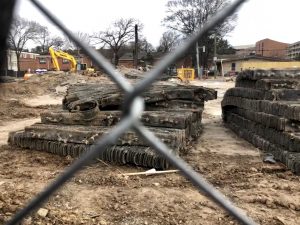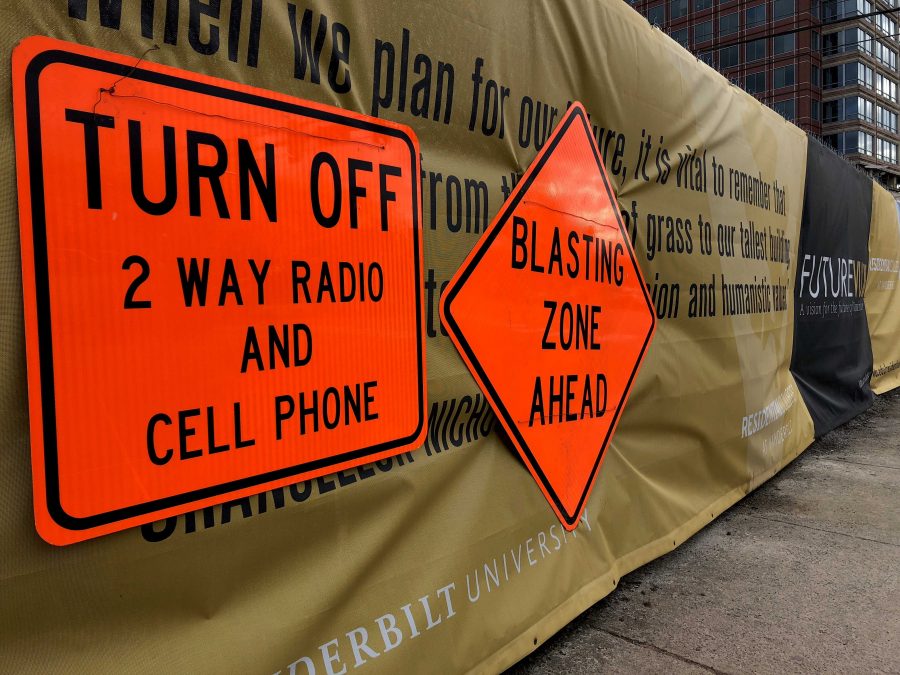At a VSG town hall on Monday morning, university administrators, construction representatives and students discussed the impacts of construction on the Tarpley lot on Carmichael Towers residents. On the corner of West End and 25th Avenue, the lot borders Greek houses and Towers 4. The event allowed roughly 20 students, especially those affected by the noise of construction, to voice their concerns and ask questions about the future impacts of construction on their daily lives.
Present at the event were Dean of Students Mark Bandas, Senior Director of Housing Operations Jim Kramka, Bob Grummon of Campus Planning & Construction, Construction Manager Brooks Rutledge and Senior Project Manager Sean Ferrell of Layton Construction, the company carrying out the construction of the residential colleges that will eventually replace Towers.
According to Grummon, the ongoing construction in the Tarpley Lot for Residential College A will be completed in 2020. Construction for Residential College B will begin in May of 2019, with construction for Residential College C starting a year after that. The entire West End project will be complete in 2023, in time for the university’s one hundred and fiftieth anniversary celebration.
Students at the town hall voiced their concerns about the noise of construction during early mornings, which especially affects residents of Towers 4, as the tower faces the construction site. In addition, many students complained about unexpected blasting and explosives and a lack of notification for disruptive events.
In response, Rutledge and Ferrell said that in the future, construction will start no earlier than 8 a.m. In addition, construction managers are developing a more streamlined system of scheduling to ensure that Towers residents will be aware of blasts.
“A lot of construction workers like to start at 6 a.m.,” Ferrell said at the town hall. “That doesn’t mean that we’re going to allow that here. The message that we’re trying to send is that we are an extension of the university, and we expect all of our contractors to work with us. There will be a little bit of a learning curve, but you are the reason that we’re here, and you come first.”
In the past month, Rutledge said construction has occasionally started before 8 a.m., especially as trucks prepare to enter the worksite and create noise. In the future, Rutledge and Ferrell hope to prevent this.
A student living in a Greek house on Kensington Place, which is adjacent to the construction site, addressed the need for more regular schedules from the construction company about blasts and disruptive events. While the construction company emailed students in Towers a blasting schedule through the Office of Housing and Residential Education, students living nearby were not aware of blasting times. According to Grummon, while an exact calendar of blasting would be too challenging to provide, the blasts will be restricted to specific times (9 a.m., 11 a.m. and 1 p.m.) on days when they do occur.
Moving forward, we’re trying to give you as much notice as possible of things that will be disruptive.
“An exact schedule of every day will be a little bit hard to provide,” Grummon said. “The construction company is very fluid and will tackle everything the best they can, but sometimes they have to go back and deal with something. We do need some flexibility.”
According to Rutledge, some construction situations will warrant the need to work outside of usual hours to prevent traffic buildups on 25th Avenue and West End, such as concrete placement.
“With the exception of those things which you should know about a day or so in advance, we are literally not letting guys into the job site until 8 a.m.,” Rutledge said. “Moving forward, we’re trying to give you as much notice as possible of things that will be disruptive.”
While Towers residents are concerned about the noise, the university doesn’t plan on changing construction patterns besides the 8 a.m. start time and blast notifications.
“There’s not a lot to be done in that regard,” Kramka said. “I don’t want to sound callous, but you could try earplugs. I use those when there’s construction near me.”
One student living in Towers 4 expressed concern over equal housing prices for unequal standards of living, suggesting that students living in converted Morgan and Lewis quads and housing impacted by construction pay less than students living in unaffected areas. In response, Kramka stressed that the current system of house pricing promotes financial inclusivity in housing selection.
“Vanderbilt is committed to a unified housing regiment,” Kramka said. “You pay the same. You don’t want people to have to not live somewhere because they can’t afford it. We have seen that in the past. Friends can’t move into a suite because their costs will increase. So we’ve been wed to this model, even when there has been construction.”

To alleviate unpleasant housing situations during construction, one student suggested that instead of assuring that residential colleges have an equal number of sophomores, juniors and seniors, that Warren and Moore Colleges and E. Bronson Ingram be temporarily based on a point system lottery to reconcile the situation for upperclassmen. Kramka said the university would not change the current system.
“We don’t want to change that model just for this period,” Kramka said. “To build sustainable communities that start to develop their own personalities, we want sophomores to live there and build traditions and carry on those traditions for three years. That model is not going to change.”
In addition, Kramka said the university will not convert Morgan and Lewis quads back to triplets during this time period. When asked by a student if additional beds could be added to Warren and Moore, Kramka said that this solution simply would not accommodate the number of students offset by construction.
“[Converting Morgan and Lewis triples to quads] is not something that we loved to do, but we had to have space,” Kramka said. “We thought about adding a bed to Carmichael Towers suites. It was largely senior housing. We didn’t think we wanted to do that to senior students. We knew that Highland Quad had more sophomores and juniors at that time, so we made that choice. We decided we would continue using that program until this residential college program is complete.”
We recognize that this is not something that is fun to go through.
In response to concerns about the elimination of parking for construction, Grummon said the university would not be adding additional parking as part of FutureVU, in part because of the excessive costs of garage construction and FutureVU’s plans to re-allocate the use of space on campus.
“Vanderbilt is very privileged in that we have 333 acres on campus,” Bandas said. “We’re sliced through by 25th Avenue. The desire is to green up the campus and make it more pedestrian friendly and bike friendly, which involves removing a lot of vehicular traffic from campus.”
Bandas said the university was investigating ways to improve transportation options for students, both through ongoing Nashville mass transit plans and a potential discounted rideshare program.
According to Speaker of the Senate Molly Gupta, VSG is currently investigating ways to provide discounted Lyft rides for students and potentially initiating a shuttle system for students working part-time jobs or internships. These plans are still preliminary. For the present, Bandas said the university designated a number of floors in the 25th Avenue parking garage as F spots for students.
Rutledge stressed the contractors’ desire to minimize the effects and inconvenience of construction for students on campus.
“We want to be there for you, we want you to know our faces and names and for us to know yours,” Rutledge said. “We recognize that this is not something that is fun to go through. The result is awesome, but I know that none of you will have the experience of living in these new residential colleges.”

